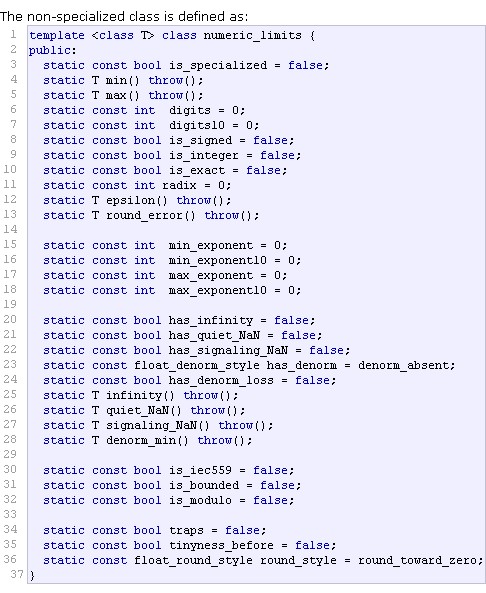包含头文件:#include<limits>
它是一个模板类,它主要是把C++当中的一些内建型别进行了封装,比如说numeric_limits<int>是一个特化后的类,从这个类的成员变量与成员函数中,我们可以了解到int的很多特性:可以表示的最大值,最小值,是否是精确的,是否是有符号等等。如果用其他任意(非内建类型)来特化这个模板类,比如string,string怎么可能有最大值?我们从MSDN上可以了解到,这对string,成员变量与成员函数是没有意义的,要么返回0要么为false。
一般来说,数值类型的极值是一个与平台相关的特性。c++标准程序库通过template numeric_limits提供这些极值,取代传统C语言所采用的预处理常数。你仍然可以使用后者,其中整数常数定义于<climits>和<limits.h>,浮点常数定义于<cfloat>和<float.h>,新的极值概念有两个优点,一是提供了更好的类型安全性,二是程序员可借此写出一些template以核定这些极值。
下面是numeric_limits定义

下面是参数的解释
|
digits10 |
返回目标类型在十进制下可以表示的最大位数 |
|
epsilon |
返回目标数据类型能表示的最逼近1的正数和1的差的绝对值 |
|
has_denorm |
测试目标类型是不是可以非规范化表示示 |
|
has_denorm_loss |
测试所有类型是不是能测出因为非规范化而造成的精度损失(不是因为结果本身的不精确) |
|
has_infinity |
测试目标类型是不是能表示无限(比如被0除,或者其他一些情况) |
|
has_quiet_NaN |
检查目标类型是不是支持安静类型的NaN |
|
has_signaling_NaN |
检查目标类型是不是支持信号类型的NaN |
|
infinity |
检查目标类型的无限类型(如果支持无限表示) |
|
is_bounded |
检查目标类型的取值是否有限 |
|
is_exact |
测试目标类型的计算结果是不是不会造成舍入误差(比如float是0) |
|
is_iec559 |
测试目标类型是不是符合IEC559标准 |
|
is_integer |
测试目标类型是不是可以用整型来表示(比如char是1,float是0) |
|
is_modulo |
Tests if a type has a modulo representation. |
|
is_signed |
测试目标类型是否是带符号的 |
|
is_specialized |
测试目标类型是不是在numeric_limits .模板类中有特殊定义 |
|
max |
返回可取的有限最大值 |
|
max_exponent |
Returns the maximum positive integral exponent that the floating-point type can represent as a finite value when a base of radix is raised to that power. |
|
max_exponent10 |
Returns the maximum positive integral exponent that the floating-point type can represent as a finite value when a base of ten is raised to that power. |
|
min |
返回可取的最小值(规范化) |
|
min_exponent |
Returns the maximum negative integral exponent that the floating-point type can represent as a finite value when a base of radix is raised to that power. |
|
min_exponent10 |
Returns the maximum negative integral exponent that the floating-point type can represent as a finite value when a base of ten is raised to that power. |
|
quiet_NaN |
返回目标类型的安静NAN的表示 |
|
radix |
Returns the integral base, referred to as radix, used for the representation of a type. |
|
round_error |
返回目标类型的最大可能的舍入误差 |
|
round_style |
Returns a value that describes the various methods that an implementation can choose for rounding a floating-point value to an integer value. |
|
signaling_NaN |
返回目标类型关于信号NAN的表示 |
|
tinyness_before |
测试目标类型是不是能测定出微小的舍入误差 |
|
traps |
Tests whether trapping that reports on arithmetic exceptions is implemented for a type. |
例:输出int、float、char、long、double、signed、unsigned、long long 的最大最小值(float中表示的是所能表示的最小值)
代码:
#include<iostream>
#include <limits>
using namespace std;
int main()
{
cout <<"TYPENAME min max"<<endl;
cout <<"==========================================================================="<<endl;
cout <<"char"<<" ";
cout << (int)numeric_limits<char>::min() <<" ";
cout << (int)numeric_limits<char>::max() <<endl;
cout <<"short"<<" ";
cout << numeric_limits<short>::min() <<" ";
cout << numeric_limits<short>::max() <<endl;
cout <<"int"<<" ";
cout << numeric_limits<int>::min() <<" ";
cout << numeric_limits<int>::max() <<endl;
cout <<"long"<<" ";
cout << numeric_limits<long>::min() <<" ";
cout << numeric_limits<long>::max() <<endl;
cout <<"float"<<" ";
cout << numeric_limits<float>::min() <<" ";
cout << numeric_limits<float>::max() <<endl;
cout <<"double"<<" ";
cout << numeric_limits<double>::min() <<" ";
cout << numeric_limits<double>::max() <<endl;
cout <<"unsigned"<<" ";
cout << numeric_limits<unsigned>::min() <<" ";
cout << numeric_limits<unsigned>::max() <<endl;
cout <<"long long"<<" ";
cout << numeric_limits<long long>::min() <<" ";
cout << numeric_limits<long long>::max() <<endl;
system("pause");
return 0;
}

C++标准库的数值极限numeric_limits,布布扣,bubuko.com
原文:http://www.cnblogs.com/yexu200241/p/3791242.html